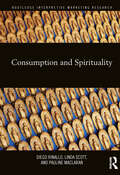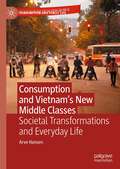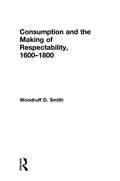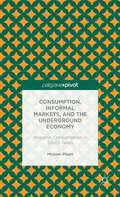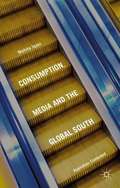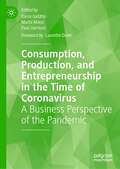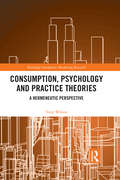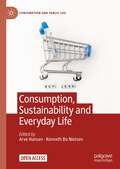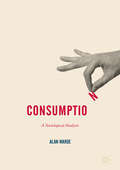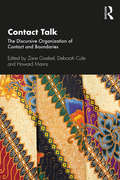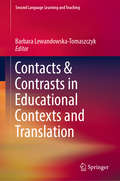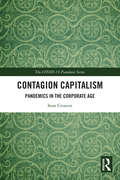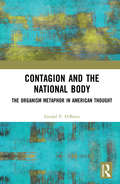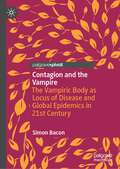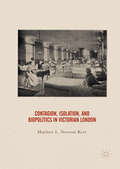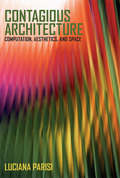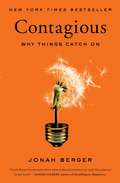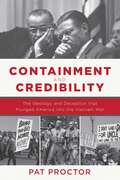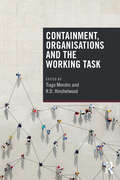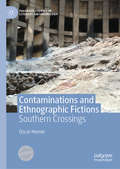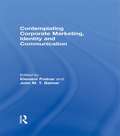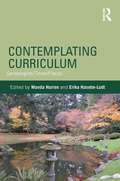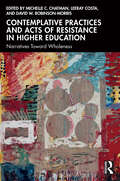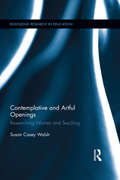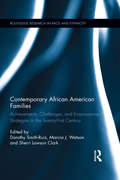- Table View
- List View
Consumption and Spirituality (Routledge Interpretive Marketing Research)
by Linda Scott Pauline Maclaran Diego RinalloThis book sheds light on the consumption of spiritual products, services, experiences, and places through state-of-the-art studies by leading and emerging scholars in interpretive consumer research, marketing, sociology, anthropology, cultural, and religious studies. The collection brings together fresh views and scholarship on a cultural tension that is at the centre of the lives of countless individuals living in postmodern societies: the relationship between the material and the spiritual, the sacred and the profane. The book examines how a variety of agents – religious institutions, spiritual leaders, marketers and consumers – interact and co-create spiritual meanings in a post-disenchanted society that has been defined as a ‘supermarket of the soul.’ Consumption and Spirituality examines not only religious organizations, but also brands and marketers and the way they infuse their products, services and experiences with spiritual meanings that flow freely in the circuit of culture and can be appropriated by consumers even without purchase acts. From a consumer perspective, the book investigates how spiritual beliefs, practices, and experiences are now embedded into a global consumer culture. Rather than condemning consumption, the chapters in this book highlight consumers’ agency and the creative processes through which authentic spiritual meanings are co-created from a variety of sources, local and global, and sacred and profane alike.
Consumption and Vietnam’s New Middle Classes: Societal Transformations and Everyday Life (Consumption and Public Life)
by Arve HansenThis book studies the dramatic changes in consumption patterns in Vietnam over the past decades, combining a focus on everyday practices and societal transformations. Zooming in on the new urban middle classes, and through in-depth case studies in the realms of mobility, food and energy, the book brings new insights to some of the most urgent global sustainability challenges. Based on a decade of research in Vietnam, the book aims to contribute to better understanding one of the most fascinating ‘development success stories’ in the world. It introduces the term ‘consumer socialism’ to analyse some of the contradictions embedded in the socialist market economy. Simultaneously, the book aims to contribute to strengthening consumption research in and on emerging economies, and for this purpose develops a theoretical approach focusing on social practices and the political economy of consumption.
Consumption and the Making of Respectability, 1600-1800
by Woodruff SmithTying together of several distinct cultural patterns during this century to create a culture of respectability and its impact on popular culture, trade, politics, social dynamics, and literature, this original and thoughtful work provides a comprehensive and much-needed understanding of the origins of modern consumption and all of its cultural impl
Consumption, Informal Markets, and the Underground Economy: Hispanic Consumption in South Texas (Palgrave Pivot)
by Michael J. PisaniUsing original qualitative ethnographic field interviews and quantitative field survey results, Consumption, Informal Markets, and the Underground Economy explores the rationale for and model of 'off the books' consumption in a borderlands environment.
Consumption, Media and the Global South: Aspiration Contested
by Mehita IqaniWhat does consumption in the global south signify, and how are its complexities communicated in media discourses? This book looks at the media representation of consumer culture in Africa, China, Brazil and India through case studies ranging from celebrity selfies, to travel websites, news reports and documentary film.
Consumption, Production, and Entrepreneurship in the Time of Coronavirus: A Business Perspective of the Pandemic
by Paul Harrison Marta Massi Elena GallittoThis book examines the impact of the continuing COVID-19 crisis on consumers and businesses. With stay-at-home orders and social distancing measures mandated by governments worldwide, businesses have made significant adjustments to adapt to the sudden changes caused by the pandemic. The book aims to understand what settling and thriving in the “new normal” have meant for businesses around the world. This book is divided into sections on production, consumption, and entrepreneurship and explores how consumer psychology has changed while also evaluating new digital business opportunities afforded by the pandemic. By bringing together psychology and marketing scholars, this interdisciplinary book will inform research on how businesses adapt to crises.
Consumption, Psychology and Practice Theories: A Hermeneutic Perspective (Routledge Interpretive Marketing Research)
by Tony WilsonPractice theories of our equipped and situated tacit construction of participatory narrative meaning are evident in multiple disciplines from architectural to communication study, consumer, marketing and media research, organisational, psychological and social insight. Their hermeneutic focus is on customarily little reflected upon, recurrent but required, practices of embodied, habituated knowing how—from choosing ‘flaw-free’ fruit in a market to celebrating Chinese New Year Reunion Dining, caring for patients to social media ‘voice’. In ready-to-hand practices, we attend to the purpose and not to the process, to the goal rather than its generating. Yet familiar practices both presume and put in place fundamental understanding. Listening to Asian and Western consumers reflecting—not only subsequent to but also within practices—this book considers activity emplacing core perceptions from a liminal moment in a massive mall to health psychology research. Institutions configure practices-in-practices cohering or conflicting within their material horizons and space accessible to social analysis. Practices theory construes routine as minimally self-monitored, nonetheless considering it as being embodied narrative. In research output, such generic ‘storied’ activity is seen as (in)formed, shaped from a shifting hierarchy of ‘horizons’ or perspectives—from habituated to reflective—rather than a single seamless unfolding. Taking a communication practices route disentangles and avoids conflating tacit and transformative construction of identities in qualitative research. Practices research crosses discipline. Ubiquitous media use by managers and visitors throughout a shopping mall responds to investigating not only with digital tracking expertise but also from an interpretive marketing viewpoint. Visiting a practice perspective’s hermeneutic underwriting, spatio-temporal metaphorical concepts become available and appropriate to the analysis of communication as a process across disciplines. In repeated practices, ‘horizons of understanding’ are solidified. Emphasising our understanding of a material environment as ‘equipment’, practices theory enables correlation of use and demographic variable in quantitative study extending interpretive behavioural and haptic qualitative research. Consumption, Psychology and Practice Theories: A Hermeneutic Perspective addresses academics and researchers in communication studies, marketing, psychology and social theory, as well as university methodology courses, recognising philosophy guides a discipline’s investigative insight.
Consumption, Sustainability and Everyday Life (Consumption and Public Life)
by Kenneth Bo Nielsen Arve HansenThis open access book seeks to understand why we consume as we do, how consumption changes, and why we keep consuming more and more, despite the visible damage we are doing to the planet. The chapters cover both the stubbornness of unsustainable consumption patterns in affluent societies and the drivers of rapidly increasing consumption in emerging economies. They focus on consumption patterns with the largest environmental footprints, including energy, housing, and mobility and engage in sophisticated ways with the theoretical frontiers of the field of consumption research, in particular on the ‘practice turn’ that has come to dominate the field in recent decades. This book maps out what we know about consumption, questions what we take for granted, and points us in new directions for better understanding—and changing—unsustainable consumption patterns.
Consumption: A Sociological Analysis (Consumption and Public Life)
by Alan WardeThis book critically reviews recent social scientific investigations of consumption, a controversial topic with moral overtones, and of popular public interest and political and economic significance. The author explores how consumption affects personal identity and social position, developing a sociological analysis using theories of practice to account for everyday consumption, its role in the social order, and its consequences for environmental sustainability. The book offers a controversial analysis which explains consumption not in terms of the purchasing of commodities but of the organization and coordination of daily practices. Consumption will be of interest to scholars and students of sociology, anthropology, geography, cultural studies, consumer research, business studies and social theory.
Contact Talk: The Discursive Organization of Contact and Boundaries
by Zane Goebel Howard Manns Deborah ColeWritten by a wide range of highly regarded scholars and exciting junior ones, this book critiques and operationalizes contemporary thinking in the rapidly expanding field of linguistic anthropology. It does so using case studies of actual everyday language practices from an extremely understudied yet incredibly important area of the Global South: Indonesia. In doing so, it provides a rich set of studies that model and explain complex linguistic anthropological analysis in engaging and easily understood ways. As a book that is both accessible for undergraduate students and enlightening for graduate students through to senior professors, this book problematizes a wide range of assumptions. The diversity of settings and methodologies used in this book surpass many recent collections that attempt to address issues surrounding contemporary processes of diversification given rapid ongoing social change. In focusing on the trees, so to speak, the collection as a whole also enables readers to see the forest. This approach provides a rare insight into relationships between everyday language practices, social change, and the ever-present and ongoing processes of nation-building.
Contacts and Contrasts in Educational Contexts and Translation (Second Language Learning and Teaching)
by Barbara Lewandowska-TomaszczykThis volume covers descriptions and interpretations of social and cognitive phenomena and processes which emerge at the interface of languages and cultures in educational and translation contexts. It contains eleven papers, divided into two parts, which focus respectively on the issues of language and culture acquisition and a variety of translation practices (general language, literature, music translation) from socio-cultural and cognitive perspectives.
Contagion Capitalism: Pandemics in the Corporate Age (The COVID-19 Pandemic Series)
by Sean CreavenContagion Capitalism situates the COVID-19 pandemic within the systems of global political economy and their attendant cultural modes and theorizes that these systems act as facilitators and drivers of global pandemic risk. Contagion Capitalism therefore critiques the institutionalized corporate-capitalist control of the economy, the state, and science, and the grave consequences this has on global public health policy, the ecological crisis of sustainability, and zoonotic pandemic events such as COVID-19. In doing so, this book addresses the failings of what may be termed as "state science" or "establishment science" in managing the pandemic, as personified especially by those elements of the scientific elite placed in the service of the neoliberal state. This book also explores the limitations of corporate pharmacological technoscience in safeguarding public health, arguing that ‘Big Pharma’ offers only partial remedies for problems of human illness and wellbeing, poses its own dangers to public health, and obfuscates the social bases of public ill-health and of pandemic risk. Contagion Capitalism further argues that COVID-19 will not be the last or even the most dangerous such epidemiological event. This is because the social production and global dissemination of zoonotic diseases is integral to contemporary capitalism, by virtue of its instrumental mode of science, its central dynamic of production for the sake of accumulation, and the consumer mode this sustains as its own condition of existence. These are the drivers of what may be termed as zoonotic accelerationism. Contagion Capitalism will appeal to scholars in the humanities and social sciences with interests in neoliberal ideology and global political economy, and their impact upon social, political and cultural life.
Contagion and the National Body: The Organism Metaphor in American Thought
by Gerald O'BrienDrawing on the work of George Lakoff, this book provides a detailed analysis of the organism metaphor, which draws an analogy between the national or social body and a physical body. With attention to the manner in which this metaphor conceives of various sub-groups as either beneficial or detrimental to the (social) body’s overall functioning, the author examines the use of this metaphor to view marginalized sub-populations as invasive or contagious entities that need to be treated in the same way as harmful bacteria or pathogens. <P><P>Analyzing the organism metaphor as it was employed in the service of social injustice through the nineteenth and twentieth centuries in the United States, Contagion and the National Body focuses on the alarm eras of the restrictive immigration period (1890–1924), the agitation against Chinese and Japanese populations on the West Coast, the eugenic period’s targeting of feeble-minded persons and other "defectives," periods of anti-Semitism, the anti-Communist movements, and various forms of racial animosity against African-Americans.
Contagion and the Vampire: The Vampiric Body as Locus of Disease and Global Epidemics in 21st Century
by Simon BaconThis book examines how the vampire has always been connected to ideas of infection, pollution and disease—even more so in the 21st century where it expresses the horrors of unseen and unstoppable disease and the foreboding and anxiety that accompany viral outbreaks and wider epidemics. Here the vampire gives physical form to the contagion and associated anxieties around the perceived causes and spread of disease, where it can take on many forms from animal to pestilential particulate matter, creeping shadows and even malignant weather systems. If blood is life, it is the body of the vampire that is death. This timely study looks at how and why the vampire continues to fulfil this function and posits that the true patient zero in the 21st century is no longer the dangerous, ancient, outsider from the East but is the undying monster that is Western culture itself.
Contagion, Isolation, and Biopolitics in Victorian London
by Matthew L. Newsom KerrThis book is a history of London's vast network of fever and smallpox hospitals, built by the Metropolitan Asylums Board between 1870 and 1900. Unprecedented in size and scope, this public infrastructure inaugurated a new technology of disease prevention--isolation. Londoners suffering from infectious diseases submitted themselves to far-reaching forms of surveillance, removal, and detention, which made them legible to science and the state in entirely new ways. Isolation on a mass scale transformed the meaning of urban epidemics and introduced contentious new relationships between health, citizenship, and the spaces of modern governance. Rich in archival sources and images, this engaging book offers innovative analysis at the intersection of preventive medicine and Victorian-era liberalism.
Contagious Architecture: Computation, Aesthetics, and Space (Technologies of Lived Abstraction)
by Luciana ParisiA proposal that algorithms are not simply instructions to be performed but thinking entities that construct digital spatio-temporalities.In Contagious Architecture, Luciana Parisi offers a philosophical inquiry into the status of the algorithm in architectural and interaction design. Her thesis is that algorithmic computation is not simply an abstract mathematical tool but constitutes a mode of thought in its own right, in that its operation extends into forms of abstraction that lie beyond direct human cognition and control. These include modes of infinity, contingency, and indeterminacy, as well as incomputable quantities underlying the iterative process of algorithmic processing. The main philosophical source for the project is Alfred North Whitehead, whose process philosophy is specifically designed to provide a vocabulary for “modes of thought” exhibiting various degrees of autonomy from human agency even as they are mobilized by it. Because algorithmic processing lies at the heart of the design practices now reshaping our world—from the physical spaces of our built environment to the networked spaces of digital culture—the nature of algorithmic thought is a topic of pressing importance that reraises questions of control and, ultimately, power. Contagious Architecture revisits cybernetic theories of control and information theory's notion of the incomputable in light of this rethinking of the role of algorithmic thought. Informed by recent debates in political and cultural theory around the changing landscape of power, it links the nature of abstraction to a new theory of power adequate to the complexities of the digital world.
Contagious: Why Things Catch On
by Jonah Berger<P>What makes things popular? If you said advertising, think again. People don't listen to advertisements, they listen to their peers. But why do people talk about certain products and ideas more than others? Why are some stories and rumors more infectious? And what makes online content go viral? <P> Wharton marketing professor Jonah Berger has spent the last decade answering these questions. He's studied why New York Times articles make the paper's own Most E-mailed List, why products get word of mouth, and how social influence shapes everything from the cars we buy to the clothes we wear to the names we give our children. In this book, Berger reveals the secret science behind word-of-mouth and social transmission. Discover how six basic principles drive all sorts of things to become contagious, from consumer products and policy initiatives to workplace rumors and YouTube videos. <P>Contagious combines groundbreaking research with powerful stories. Learn how a luxury steakhouse found popularity through the lowly cheese-steak, why anti-drug commercials might have actually increased drug use, and why more than 200 million consumers shared a video about one of the seemingly most boring products there is: a blender. If you've wondered why certain stories get shared, e-mails get forwarded, or videos go viral, Contagious explains why, and shows how to leverage these concepts to craft contagious content. <P>This book provides a set of specific, actionable techniques for helping information spread--for designing messages, advertisements, and information that people will share. Whether you're a manager at a big company, a small business owner trying to boost awareness, a politician running for office, or a health official trying to get the word out, Contagious will show you how to make your product or idea catch on. <P><b>A New York Times Bestseller</b>
Containment and Credibility: The Ideology and Deception that Plunged America into the Vietnam War
by Pat ProctorIs it possible that a president and his administration would purposefully mislead the American public so that they could commit the United States to a war that is not theirs to fight? Anyone with even a remote memory of the phrase "weapons of mass destruction” probably finds such a question naive. On the eve of the fiftieth anniversary of the Vietnam War, those with longer memories would consider the unquestioning acceptance of Saddam Hussein’s "gathering threat” even more naive. Providing historical context that highlights how the decision to use force is made, as well as how it is "sold,” Containment and Credibility explores how the half-truths and outright lies of both the Johnson and Nixon administrations brought us into a conflict that cost more than fifty thousand American lives over eight years. As we consider how best to confront the growing threat of ISIS, it is increasingly important for the public to understand how we were convinced to go to war in the past. In the 1960s, the domino theory warning of the spread of communism provided the rationale for war, followed by the deception of the Gulf of Tonkin Incident and the resulting resolution that essentially gave LBJ a blank check. This book will show how this deception ultimately led to the unraveling of the Johnson presidency and will explore the credibility gap that led to the public political debate of that time. Containment and Credibility applies the lessons of the sixties to today’s similar debates regarding military involvement. Skyhorse Publishing, as well as our Arcade imprint, are proud to publish a broad range of books for readers interested in history--books about World War II, the Third Reich, Hitler and his henchmen, the JFK assassination, conspiracies, the American Civil War, the American Revolution, gladiators, Vikings, ancient Rome, medieval times, the old West, and much more. While not every title we publish becomes a New York Times bestseller or a national bestseller, we are committed to books on subjects that are sometimes overlooked and to authors whose work might not otherwise find a home.
Containment, Organisations and the Working Task
by Tiago Mendes HinshelwoodWith close attention to Wilfred Bion's influence on the literature about groups and organisations, this book explores how containment has been transposed from the clinical setting to enlighten the work being carried out by psychodynamic practitioners and researchers, especially within organisations.In the first part, contributors explore the origins of containment, comparing and contrasting it with similar concepts such as holding. A second part is devoted to addressing the implications of utilising psychoanalytic ideas beyond the couch and bringing them to the social field of groups and organisations. The early days of such ideas, as well as the wide range of methods applied, are also addressed in this section with the aim of giving the reader a more comprehensive base for the application of psychoanalytic knowledge. Finally, the third part provides a detailed view of the different applications of containment in consulting, leadership, therapeutic communities and group relations. Drawing on their own experiences, the authors highlight how psychoanalytic concepts impact their own practice, contributing to a collection that will prove essential for psychoanalysts, managers, policymakers, consultants and researchers in a wide range of professional and clinical settings.
Contaminations and Ethnographic Fictions: Southern Crossings (Palgrave Studies in Literary Anthropology)
by Oscar HemerIn an unusual merging of academic and literary practices, this volume attempts to identify a form (or forms) that is congenial with the subject of interrogation: the world in transition, with South Africa as the main focal point. Approaching anthropology from the position of the literary writer, Oscar Hemer here takes the reader through a kaleidoscope of perspectives—a stream-of-consciousness understanding of “writing the city” of Johannesburg, embedding ethnography in subjectivity; a challenge to binaries both temporal and gendered in examining the growth of the IT metropolis Bangalore to a combusting mega-city; an auto-ethnographic interweaving of fictional reportage with a close-reading of anthropological and philosophical treatises, including Mary Douglas’s Purity and Danger and Edouard Glissant’s Poetics of Relation, among others—to interrogate themes of transition, identity, purity and variation in the Western Cape. As the form transcends boundaries to create a methodological hybrid, creolization comes to the fore as a theoretical concept and as cultural practice.
Contemplating Corporate Marketing, Identity and Communication
by Klement Podnar John M. T. BalmerSince the first International Corporate Identity Group’s symposium in 1994, the fields of corporate identity, corporate communications and corporate branding have become a focal point for scholars and managers alike. Recently, the term corporate marketing has incorporated a host of key corporate-level concepts, representing a new paradigm of thought. Contemplating Corporate Marketing, Identity and Communication is a collection of papers and extended abstracts from the 12th ICIG symposium, presenting a variety of perspectives with a view towards stimulating debate about the advances in corporate marketing, identity and communication. The contributions in this volume examine critically the development of the field and focus for future research in order to encourage cutting-edge scholarship along with practitioner insights. In a field characterized by paradoxes – unity and variety; integration and specialization – the aim is to integrate diverse practices to inspire a more sophisticated approach or theoretical framework. The papers in this volume are both challenging and distinctive.
Contemplating Curriculum: Genealogies/Times/Places (Studies in Curriculum Theory Series)
by Erika Hasebe-Ludt Wanda HurrenContemplating Curriculum takes up world-renowned curricular scholar, teacher, and mentor Ted T. Aoki’s invitation to contemplate where curriculum scholars situate themselves in their work. At the same time it probes into the historical and present conditions that make it both possible and impossible to attend to this work in classrooms and communities in mindful, embodied, and aesthetic ways, both locally and globally. The book offers a strong representative sampling of contemporary thinking in the field with a focus on contemplative approaches to curriculum. In their theorizing, contributors call on literary and other mixed-genre formats, such as creative nonfiction, poetry, and essay. They acknowledge the importance of intergenerational dialogue and recognize the importance of time and place in curricular, pedagogical, and personal sense-making. These written and visual texts invite contemplation on notions of curriculum, both planned and lived, in an Aokian spirit of intertextuality.
Contemplative Practices and Acts of Resistance in Higher Education: Narratives Toward Wholeness
by Michelle C. Chatman LeeRay Costa Robinson-Morris, David W.The contributors to this volume – educators, student affairs practitioners, and higher education staff – heartfully share a broad range of contemplative practices and acts of resistance used within the confines of shattered systems and institutions for themselves, their colleagues, and their students. The narratives in this volume broadly imagine, inspire, recount, and guide readers toward the fullness of their humanity and wholeness within institutions of higher education. At the same time, these accounts navigate the operational realities of daunting demands on the mind, body, and spirit, the growing turbulence of working on higher education campuses across the country, and a sense of urgency toward collective life affirmation within modern higher education institutions. Each chapter features critical framing of a concept, personal stories of this concept in action, and descriptions of contemplative practices for readers to use in their own contexts. Together, chapter authors demonstrate what it means to be a contemplative practitioner attentive to issues of power, racism, and marginalization in higher education today. With a deep breath and mindful awareness, this book invites faculty and staff at colleges and universities on a transformational journey with the contributors toward fullness in pursuit of becoming whole and inspiring change.
Contemplative and Artful Openings: Researching Women and Teaching (Routledge Research in Education #193)
by Susan Casey WalshHighlighting an arts-based inquiry process that involves contemplation, mindful awareness, and artful writing, this book explores women’s difficult experiences in teaching. It weaves a strong autobiographical thread with artifacts from several research projects with female teachers. By linking innovative approaches to research that involve visual images and poetic writing with feminist poststructuralist theories and Buddhist-inspired practices, Walsh offers new understandings about what it means to be critical in research and teaching—and also what transformation, both social and personal, might entail.
Contemporary African American Families: Achievements, Challenges, and Empowerment Strategies in the Twenty-First Century (Routledge Research in Race and Ethnicity)
by Dorothy Smith-Ruiz Sherri Lawson Clark Marcia J. WatsonFor decades the black community has been perceived, both in the United States and around the world, as one which thinks alike, acts alike and lives alike - in poor and downtrodden environments. Following the persistent effects of the great recession and the American elections of 2008, now more than ever the political and socio-economic state of America is crying out for this deficient and prejudiced conception to be dispelled. Focusing primarily on black families in America, Contemporary African American Families updates empirical research by addressing various aspects including family formation, schooling, health and parenting. Exploring a wide class spectrum among African American families, this text also modernizes and subverts much of the research resulting from Moynihan’s 1965 report, which arguably misunderstood the lived experiences of black people during the movement from slavery to freedom in a Jim Crow society. A timely subversion of the myth that America is successfully in a post-racial era, this new anthology on the Black Family in America will appeal to advanced undergraduate students and research scholars interested in black studies, Africana studies, women and gender studies, sociology, political science, anthropology, criminal justice, education, psychology, public policy, healthy policy and social work.
